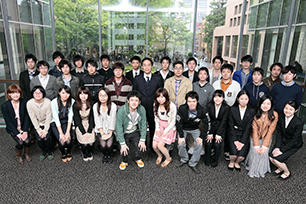Atsuhiro Yamada, Professor, Faculty of Economics
Social security and employment policy: inseparable and essential for our livelihood
In this seminar group of 17 third-year students and 18 fourth-year students, the fourth-year students join the faculty members in making comments on the third-year students’ research reports, epitomizing the Keio tradition of hangaku hankyo, “learning while teaching, teaching while learning.”

Social policy eliminates many concerns that might arise in daily life and guarantees a livelihood for all. There are many different circumstances in which one may face difficulty maintaining a livelihood, such as the death of a wage earner in the family, unemployment, child-rearing, providing nursing care for a loved one, injury and sickness, impairment, or old age. In all of these cases there are social security provisions to assist should one’s income drop or should one require a certain service. Meanwhile, employment policy exists to allow people who are able to work to maintain a healthy and full lifestyle. Together, these two elements of social policy perform an inseparable and essential role in ensuring our livelihoods. In our seminar class, we evaluate social policy based on data.
Japan’s social policy now faces two issues. The first issue is how to improve social policy for the current working generation, and the second is how to shoulder increasing social security costs between and among generations. The level of poverty in Japan is high, particularly in comparison with other developed countries. For example, in the case of single-female-parent households, Japan’s poverty levels are the worst among developed countries. Moreover, due to income stagnation in the low-income sector of the population, income gaps are widening. Improving social policy for the current generation has become particularly important in light of social phenomena such as the working poor, who cannot become financially independent even if they have a job; the wage gap between permanent and temporary employees; disparities in employment protection and the risk of unemployment; disparities in training opportunities and social insurance coverage; the increase in temporary employment among young and middle-aged workers, and the rising unemployment rate among young people.
A single reform to the system is not enough to address these issues. It is necessary to examine Japan’s social policy system as a whole to solve issues based on overall consistency. At the same time, we must avoid focusing so heavily on financial sustainability that we neglect social sustainability. In fact, it is little known that though Japan’s population is aging faster than any other developed country, our social security is relatively small-scale when compared to the size of our economy.
Many students seem to think that a life with a job and family is a given. I hope that they will pursue research that will allow them to understand the naïveté of this assumption and the roles that social policy fulfills, so they can also grasp how these problems directly affect their own lives.
Student’s Voices
Keiichi Miyawaki, Fourth-year student, Faculty of Economics
The reality of Professor Yamada’s seminar class
My friends often say to me, “I guess Professor Yamada’s class is tough.” They aren’t completely off the mark in the sense that we do put a lot of effort into our research.
For example, when our turn comes to give a report on our research progress, we are filled with fear. If we haven’t gone through enough literature or our logic is unclear, our professor will very quickly point it out and will also make detailed demands on our methods of presentation. Somewhat dejected, we seclude ourselves in the library or PC room and try again.
However, to us, Professor Yamada is someone who loves his family and Diet Coke above all else and who puts us at ease with his witty comments. This, coupled with the quirky, cheerful characters of the students, creates an easygoing atmosphere in our class. Thanks to Prof. Yamada’s strict guidance and our hard work, before long we find our research perfectly polished and presentable. In short, it’s a great seminar class.
*Position titles, etc., are those at the time of publishing.
